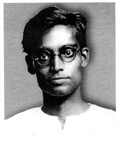Barman, Reboti Mohan
Barman, Reboti Mohan (1903-1952) Marxist theorist and leader of the anti-British, independence movement. He was born in a Kshatriya family in the village of shimulkandi in Bhairab Upazila of Kishoreganj district in 1903. His father Hormohan Borman was a lawyer who was honoured with the title of Raibahadur. His mother was Ruxmini Devi. He passed the matriculation examination in 1922 and was obtained his BA. Degree in 1926. He did his MA in 1928 in Economics, securing first position from Kolkata University and was awarded Jagattarine gold medal for his excellent result.

In 1923-1924, Reboti Mohan Barman led the Comilla-Brahmanbaria unit of the Bengal Volunteer, and worked in Kolkata, Bakura and Birbhum when he was involved in Shri Sangha. He took a leading position in the student and youth movements in 1927-1928 and with the money that he possessed after selling his gold medal, brought out and edited a monthly literary magazine titled Benu in order to inspire the young generation in patriotism. His first book Tarun Rush was published in 1929.
In 1930, police arrested Reboti Mohan Barman in connection with the revolutionaries' attacks on the police commissioner Charles Tegart in Kolkata. He was incarcerated without trial and was transferred from one district to another. While in prison, he had a good exposure to, and became fascinated with, the philosophy of Marx and Lenin. As a result, when he was in interned in the Deoli Jail, he along with other inmates, brought out The Communist and the Sanghati (unity). Through study circles, he used to indoctrinated others inmates into Marxism and Leninism. After the imprisonment of a long period of eight years, he was released from Deuli Jail at Rajputana on 21 July 1938. Then he became involved with the Communist Party through Comrade Muzaffar Ahmad and devoted himself to organising the workers and the peasants in order to establish communism in Bengal.
He emerged as a popular leader after working among the workers of Dhakexwari Cotton Mill and in Belghoria. He played a big role in the peasant movement and in developing agriculture and in ameliorating the condition of the peasantry. On 22 March 1939, on behalf of the peasant organisation, Reboti Mohan Barman gave an oral testimony to the Land Revenue Commission formed by Sir F Floyd in 1938; and he was one of the authors of the 62-pages long memorandum that was submitted to the Commission. Reboti Mohan Barman completely devoted himself to writing and publishing books to disseminate Marxist ideas. He along with Comrade Muzaffar Ahmad and others established a socialist publishing house named National Book Agency in Kolkata in 1939 and Gano-Sahitya Chakra in Dhaka. His important works are: Samajtantrik Arthonity (Socialist Economics, 1938), Marx Probexika (Introduction to Marx,1938), Krishok O Zamindar (Peasant and Zamindar, 1938), Samrajyabader Sankot (Crisis of Imperialism, 1938), Hegel O Marx (Hegel and Marx, 1938), Bharater Krishoker Sangram O Andolon (Struggles of the Indian Peasantry, 1938), Lenin O Bolshevik Party (Lenin and Bolshevik Party, 1939), Arthonitir Gorar Kotha (Fundamentals of Economics, 1945), Samaj O Sabhyatar Kromobikaxh (Development of Society and Civilisation, 1952), etc.
Before World War II, he fell ill and returned to his village Shimulkandi. He became very sad for the communal riots that happened after the partition of India and left his birthplace for Agartala in 1951 and died there on 6 May 1952. [Shafiqul Islam]
